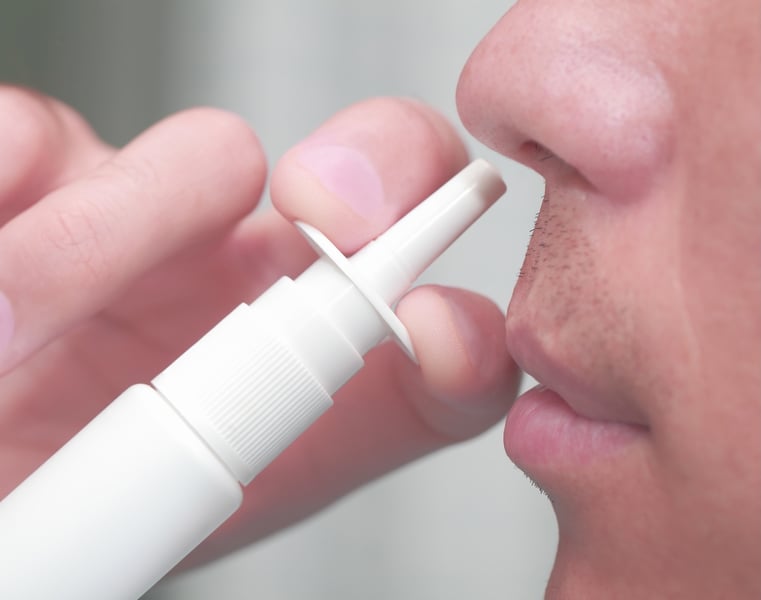Manténgase sano!

- Posted October 5, 2023
Ketamine Nasal Spray Shows Promise Against Tough-to-Treat Depression
A nasal spray containing a ketamine derivative appears to beat one of the standard drugs used for people with difficult-to-treat depression, a new clinical trial has found.
The trial, of nearly 700 people with treatment-resistant depression, found that esketamine nasal spray was more effective at sending patients into remission than a standard oral drug called quetiapine (Seroquel).
After eight weeks, 27% of esketamine patients were in remission, versus 18% of those given quetiapine. By week 32, half of esketamine patients were faring that well, compared with one-third of those on quetiapine.
Experts said the findings, published in the Oct. 5 issue of the New England Journal of Medicine, strengthen the case that esketamine is a good option for people with treatment-resistant depression.
The condition, which plagues up to 30% of people with depression, is generally diagnosed when a person's symptoms have failed to yield to at least two standard antidepressants. It's a situation that places people at increased risk of hospitalization and suicide.
There are a few medications approved in the United States as an "augmentation" therapy for treatment-resistant depression -- meaning they are used along with a standard antidepressant.
Quetiapine is one of them, and so is esketamine nasal spray, which has been available since 2019 under the brand-name Spravato.
That approval was based on research testing esketamine against a placebo nasal spray.
The new trial is the first to compare esketamine against another commonly used add-on drug, said lead researcher Dr. Andreas Reif, head of psychiatry at University Hospital Frankfurt-Goethe University, in Germany.
And the nasal spray came out the winner, sending more patients into remission and preventing more symptom relapses over the course of 32 weeks.
"This study provides valuable data to inform long-term clinical decision-making for a large patient population -- for whom such treatment goals are rarely met," Reif said.
Reif said he and his colleagues expect the findings "will change medical practice in many countries, for the good of our patients."
But the study, which was funded by Spravato maker Janssen, does not mean that esketamine is for everyone.
People need to work with their doctor to figure out what's right for them, Reif said.
And there's a lot to consider.
Ketamine was first approved in the United States decades ago as an anesthesia drug. It can have what doctors call "dissociative" effects -- or what a layperson would call a "trip." Because of those effects, ketamine also came to be abused as a party drug, known by nicknames like "special K."
But researchers have long been aware of the drug's potential to treat psychiatric symptoms, at low doses under medical supervision. Ketamine is not approved by the U.S. Food and Drug Administration for treating depression. But doctors can and do prescribe it "off label" for that reason, in which case it's given by IV.
Esketamine, although a nasal spray, also has to be given under medical supervision. That's done to monitor for side effects, which besides mind-altering symptoms can include blood pressure spikes and sedation.
"This is not something you can get from the pharmacy and take home," said Dr. David Hellerstein, a professor of clinical psychiatry at Columbia University Irving Medical Center, in New York City.
The usual esketamine schedule is twice a week for the first month, then once weekly for month two, and once weekly or every two weeks thereafter.
"It's a commitment," said Hellerstein, who was not involved in the trial. And that inconvenience, plus the high cost of Spravato, can be big obstacles.
At the same time, Hellerstein added, when people respond to esketamine, it often happens fairly quickly -- which is an important positive.
"A lot of depression treatments take months to work," Hellerstein explained, noting that ketamine and esketamine work by mechanisms that are different from existing medications.
Research indicates that the drugs boost activity in a chemical called glutamate, which helps brain cells communicate. They also appear to foster the regrowth of synapses -- connections among brain cells that can be depleted in people with longstanding depression.
Esketamine is "not a home run," Hellerstein said, but it is an option for a condition where more are needed.
Like Reif, he said that for any one person the decision on treatment has to be individualized.
More information
HealthDay has more on ketamine/esketamine for treating depression.
SOURCES: Andreas Reif, MD, head, psychiatry, psychosomatic medicine and psychotherapy, University Hospital Frankfurt-Goethe University, Frankfurt, Germany; David Hellerstein, MD, professor, clinical psychiatry, Columbia University Irving Medical Center, research psychiatrist, New York State Psychiatric Institute, New York City; New England Journal of Medicine, Oct. 5, 2023
